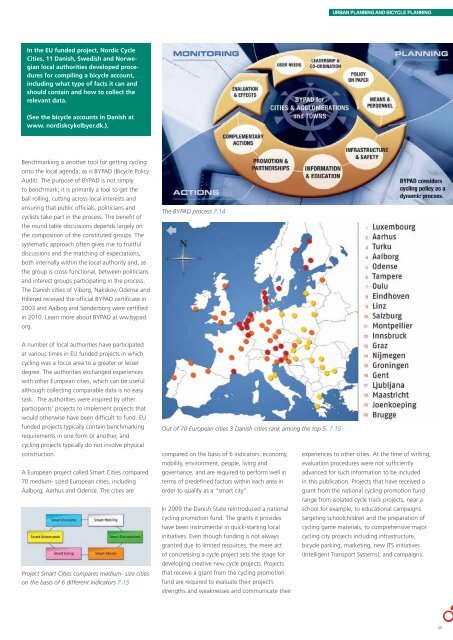Collection of Cycle Concepts 2012.pdf - Fietsberaad
Collection of Cycle Concepts 2012.pdf - Fietsberaad
Collection of Cycle Concepts 2012.pdf - Fietsberaad
You also want an ePaper? Increase the reach of your titles
YUMPU automatically turns print PDFs into web optimized ePapers that Google loves.
URBAN PLANNING AND BICYCLE PLANNING<br />
In the EU funded project, Nordic <strong>Cycle</strong><br />
Cities, 11 Danish, Swedish and Norwegian<br />
local authorities developed procedures<br />
for compiling a bicycle account,<br />
including what type <strong>of</strong> facts it can and<br />
should contain and how to collect the<br />
relevant data.<br />
(See the bicycle accounts in Danish at<br />
www. nordiskcykelbyer.dk.).<br />
Benchmarking is another tool for getting cycling<br />
onto the local agenda, as is BYPAD (Bicycle Policy<br />
Audit). The purpose <strong>of</strong> BYPAD is not simply<br />
to benchmark; it is primarily a tool to get the<br />
ball rolling, cutting across local interests and<br />
ensuring that public <strong>of</strong>ficials, politicians and<br />
cyclists take part in the process. The benefit <strong>of</strong><br />
the round table discussions depends largely on<br />
the composition <strong>of</strong> the constituted groups. The<br />
systematic approach <strong>of</strong>ten gives rise to fruitful<br />
discussions and the matching <strong>of</strong> expectations,<br />
both internally within the local authority and, as<br />
the group is cross-functional, between politicians<br />
and interest groups participating in the process.<br />
The Danish cities <strong>of</strong> Viborg, Nakskov, Odense and<br />
Hillerød received the <strong>of</strong>ficial BYPAD certificate in<br />
2003 and Aalbog and Sønderborg were certified<br />
in 2010. Learn more about BYPAD at ww.bypad.<br />
org.<br />
The BYPAD process 7.14<br />
A number <strong>of</strong> local authorities have participated<br />
at various times in EU funded projects in which<br />
cycling was a focus area to a greater or lesser<br />
degree. The authorities exchanged experiences<br />
with other European cities, which can be useful<br />
although collecting comparable data is no easy<br />
task. The authorities were inspired by other<br />
participants’ projects to implement projects that<br />
would otherwise have been difficult to fund. EU<br />
funded projects typically contain benchmarking<br />
requirements in one form or another, and<br />
cycling projects typically do not involve physical<br />
construction.<br />
A European project called Smart Cities compared<br />
70 medium- sized European cities, including<br />
Aalborg, Aarhus and Odense. The cities are<br />
Project Smart Cities compares medium- size cities<br />
on the basis <strong>of</strong> 6 different indicators 7.15<br />
Out <strong>of</strong> 70 European cities 3 Danish cities rank among the top 5. 7.15<br />
compared on the basis <strong>of</strong> 6 indicators: economy, experiences to other cities. At the time <strong>of</strong> writing,<br />
mobility, environment, people, living and<br />
evaluation procedures were not sufficiently<br />
governance, and are required to perform well in advanced for such information to be included<br />
terms <strong>of</strong> predefined factors within each area in in this publication. Projects that have received a<br />
order to qualify as a “smart city”.<br />
grant from the national cycling promotion fund<br />
range from isolated cycle track projects, near a<br />
In 2009 the Danish State reintroduced a national school for example, to educational campaigns<br />
cycling promotion fund. The grants it provides targeting schoolchildren and the preparation <strong>of</strong><br />
have been instrumental in quick-starting local cycling game materials, to comprehensive major<br />
initiatives. Even though funding is not always cycling city projects including infrastructure,<br />
granted due to limited resources, the mere act bicycle parking, marketing, new ITS initiatives<br />
<strong>of</strong> concretising a cycle project sets the stage for (Intelligent Transport Systems), and campaigns.<br />
developing creative new cycle projects. Projects<br />
that receive a grant from the cycling promotion<br />
fund are required to evaluate their project’s<br />
strengths and weaknesses and communicate their<br />
45



